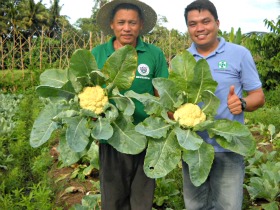Ecotourism Holiday In Laguna, Philippines Gets a Boost
Ecotourism holiday in the Philippines
Dateline: Los Banos, Laguna, Philippines - Some 100 square miles of fragile, pristine and protected areas in Lobo, Batangas province will soon be opened as an agro-ecotourism village. Boasting of a burgeoning population of more than 38,000 persons, nearly a third, however, are sustained by rural communities.
Categorized as a third class municipality, there is nothing third class nonetheless about its agro-ecotourism village plans.
Dr. Alexander R. Madrigal, regional director of DOST IV-A, has been convening meetings for the past two years with Lobo’s local officials, the Rural Bank of Lobo, the Lobo Resort Owners Association, Batangas State University, and a few members of the Regional Development Council as minor partner institutions. Discussions focus on transforming four areas of Lobo’s tourism treasures into volunteer tourism or agro-ecotourism spots where travel will be responsible and low-impact (protective of the environment).

Ecotourism Holiday In the Philippines via zacsarian.blogspot.com |
The group’s ecotourism plans aim to educate the traveler about the different social and natural environments in Lobo. For its full launch in 2013, it is targeting 25,000 of in-bound domestic and foreign tourists as regular monthly visitors of the four areas. When realized, Lobo can be listed as a must-see Philippine Destination. It may become one of very few places in the country that offers volunteer tourism on a municipal-wide scale.
Prime spots such as biologically diverse destinations will showcase the Philippine teak (a yellowish brown wood valued for its durability), the Ook sa Dungon (larvae of beetles found in Dungon trees and eaten as a delicacy), and bayoko mountain snails, among others. Viewing/Hiking fees will provide funds for their ecological conservation.
The biodiversity in these places is considered significant by the group. Thus they support conduct of R&D studies to ensure that these remain undisturbed by human intervention for future generations to experience.
On the other hand, historical and cultural heritage spots being important past witnesses are considered by Batangas State University as timeless teaching-learning tools.
The group plans to restore and preserve the Spanish Light House of Malabrigo, St. Michael’s Church, and some ancestral houses, among others. Their goal is to foster greater appreciation of Lobo’s cultural environment. Plans to register and label these structures as UNESCO World Heritage Sites are being explored.
The group is also planning to promote recycling, energy efficiency, and water conservation in more than 30 beach resorts. A focus on environmental responsibility through conduct of non-polluting activities in leisure camps such as the Submarine Garden and coral reef dive sites will provide tourists insight into the impact of people on the environment. The aim is to foster appreciation and preservation of Lobo’s natural habitats.
But, more than the group’s plan to minimize the negative aspects of conventional tourism on the environment, they are also working on creation of economic opportunities for 25 Barangays. A Techno Pinoy Center cum Tourist Information Center will offer participating Barangays package of S&T interventions that will make locally produced products economically competitive and marketable.
These include wine and candies from Tamarind, organic rice and vegetables, and hand crafted products from bamboo, to name a few.
Meanwhile, two simulation volunteer tours were conducted over several months. Organizers gathered third party observations about the offerings. The tours covered the lighthouse in Malabrigo, a mangrove boat ride, and a walk along Tulay na Busog in Barangay Nagtalutong, among others. It showcased Calo weaving, and a tour of a sardines plant and Tamarind winery.
Two resort owners suggested modifying types of tour packages. These should showcase the spots’ selling points following group size and age of touring groups. The others saw the need to add and upgrade public service support systems. These include offering food and gift choices unique to the area, providing easy access through public or private transportation, and construction of more hotel bed and bath rooms. In addition, conference halls, and other recreation and entertainment facilities should be equipped.
The group plans to draft soon the comprehensive master plan and initiate construction of needed structures. With these, Lobo will shortly be known, not just as a third class municipality, but, as a viable agro-ecotourism village. And one that truly observes sustainable and responsible volunteer tourism. (CPG/AMGuevarra, DOST IV-A S&T Media Service/NDS, PIA-Calabarzon)


